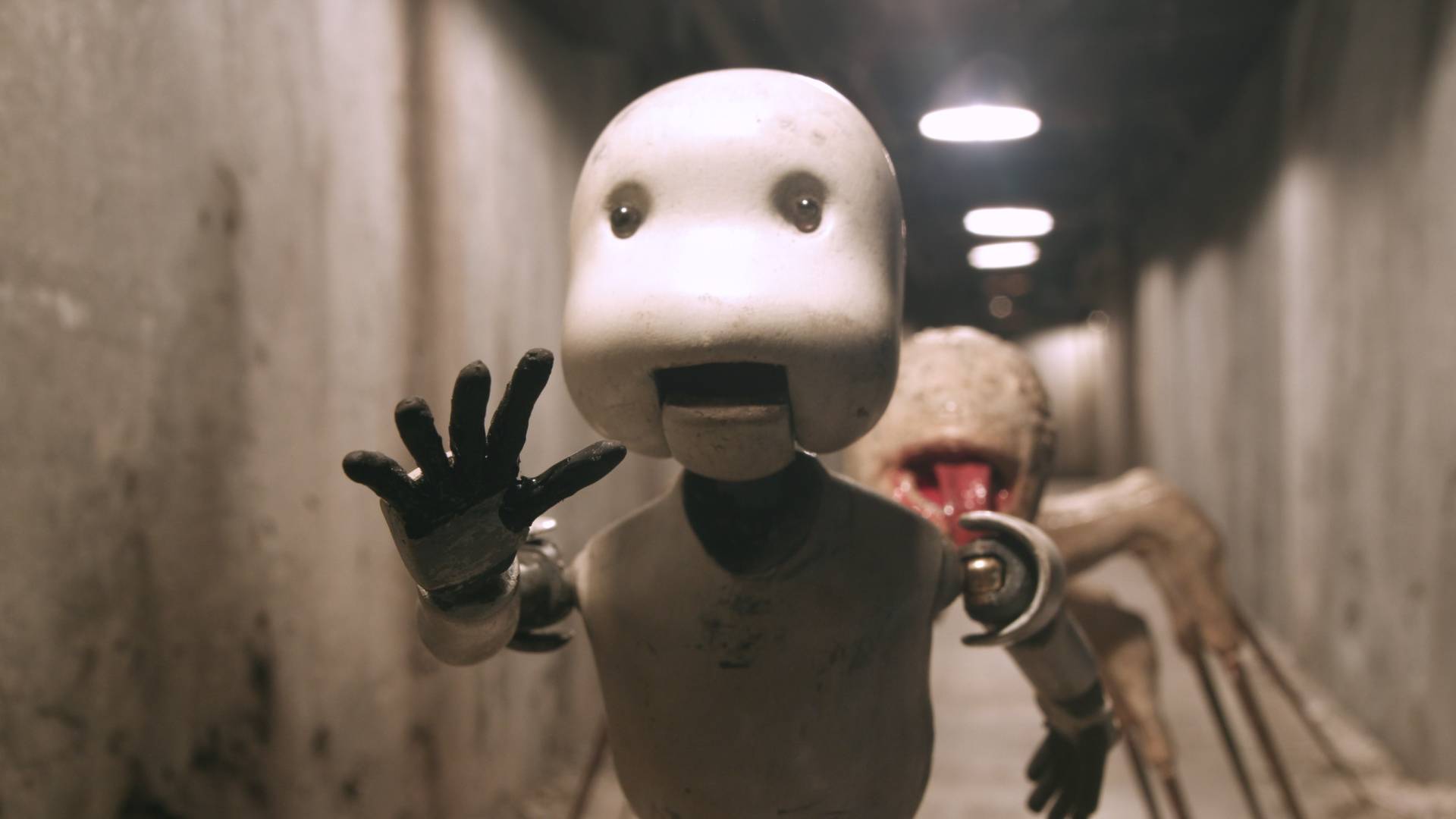What to Watch Verdict
'Junk Head' is a conceptual workshop marvel that boasts such creative vision, all molded and assembled by hands that care so passionately about every single photographed frame.
Pros
- +
🗑️ Takahide Hori's craft.
- +
🗑️ Comical, thoughtful, and sweet.
- +
🗑️ Doesn't skimp legitimate action.
Cons
- -
🗑️ Runs a bit past its breaking point.
- -
🗑️ Some might hate the choice of "dialogue."
- -
🗑️ Can feel do-it-yourself, again which might not please some.
Junk Head is part of our Fantasia Fest coverage.
Something as independently diamond-in-the-rough as Junk Head is why film festivals exist (or at least how audiences should take advantage of such events). Takahide Hori’s Japanese stop-motion marvel—produced, voiced, and created almost exclusively by Hori based on a short he also solo’ed—has been collecting laurels since 2017 when it played Fantasia prior. This year’s version is reportedly remodeled and re-edited, which will hopefully mean wider distribution so fans of Phil Tippett and Ray Harryhausen can feast their eyes upon the subterranean industrial dystopia that Hori constructs. Expect a blend of everything from Chappie to Silent Hill to energetic anime as Hori pours his soul, creativity, and funds into this heartwarmingly steampunkish tale of an amnesiac robot who can and will.
“Mankind has attained longevity through gene manipulation. In exchange, however, their ability to reproduce was lost. Marigans were created as labor to develop the underworld. It has been 1,600 years since their rebellion.”
In Hori’s universe, humankind has elongated lifespans by sacrificing everything that once made them human. Scientists and shot-callers obsess over a “Tree Of Life” phenomenon that Marigans possess—death begets trees that blossom Marigans—so they start rocketing volunteers below as investigators. We meet a virtual dance instructor who mechanizes in an exoskeleton and plummets into the concrete depths of this described “underworld,” which becomes a classist metaphor. On the way down, he’s blasted by anti-aircraft artillery and explodes into pieces; some plump, dwarfy lookin’ hunter-gatherers return his head to their mad doctor of a father figure. Thus “Junk Head” is born from spare parts, as he learns what it is to live under the dankness, direness, and mutation-heavy environment that subterraneously survives.
It’s unfathomable to imagine pouring eight years into figure molds or puppeteering an alien worm’s lunge towards lunch in stop-motion as a fraction of over one hundred thousand frames—Hori is the closest I’ll come to using “auteur” these days. Even more exceptional, Junk Head is a feature debut that admittedly lacks polish in scenes but in no way suggests inexperience behind the lens. Hori’s interior design background and handiwork passion remains inspiringly evident, whether it’s the meticulous nooks n' crannies that glisten in this steel and granite world he’s built from the ground up (what a rig) or during shocking moments when you realize how much empathy Junk Head generates. Whether he’s dashing from stinger-footed nightmare creatures, retrieving “mashrooms” so his egomaniacal master can splurge for dinner, or hunting behemoths alongside characters who resemble Minions in post-apocalyptic BDSM attire. It’s Laika but do-it-yourself, as a compliment.
I stress the absurdist, science fiction details of Junk Head between defecating four-legged freakshows and reimagined “upper versus lower” communities because that’s where Hori’s vision thrives. Buxomous, gladiatorially muscular women in red spandex suits rule over men with flexed biceps. Fable side-quests play out as edible flesh nubs become a source of greed and jealousy that innocent Junk Head doesn’t comprehend. It’s all tremendously expressive and exploding with vitality in terms of conceptualization, down to these hyper-intense chase scenes that feel one million miles per hour despite boasting no technical feats above photographic flip book cascades. There’s a wholesome arc as Junk Head is mistaken for God (religious humor abound), unlocking discussions between heaven and hell interpretations. Those who blindly follow faith juxtapose others who remain devout to research—Junk Head wanders unfazed between both ideals, solemnly committed to spreading goodness in the face of what segregation has created.
There’s a rustic style to the sometimes jagged but otherwise agile animation that showcases Junk Head. Hori manages damn near everything, which influences choices like characters speaking a nonsense language that’s just Hori gargling on saliva or mumbling gibberish (I think I heard “Pinocchio” at one point) in different tonal resonances. Hori also composes these 90s electro-rock, Gundam-sounding soundtrack blares that pay homage to hyper-exciting video games or the climax of something American television audiences might watch on Toonami. The IMDb “Full Cast & Crew” page is legitimately Hori’s name line after line, which can strain the ultimate quality in passing bursts—but it’s a small price to pay as most stop-motion figurations, action fluidity, and artistic parallels match mainstream theatrical releases. My biggest ding here is against the running time, which does drag beyond ninety minutes with—in my opinion—a more sluggish step.
The latest updates, reviews and unmissable series to watch and more!
It’s a shame that Junk Head will likely languish in US distribution purgatory because those who’re keen on experimental live-action cartoon cinema will assuredly vibe Takahide Hori’s accomplishments. I publish this review hoping to be proven wrong, or at the least, to put Junk Head on the proper radars. Hori swings like Barry Bonds after steroids, and it’s worth celebrating (no asterisk) even acknowledging the project’s justifiable roughness that some might argue as an undefeatable charm. In any case? If anything I’ve written above sounds remotely intriguing, pressure your favorite indie distribution arms to give Junk Head a chance—these are the movies that require word of mouth to succeed in and outside festival ecosystems.
Matt Donato is a Rotten Tomatoes approved film critic who stays up too late typing words for What To Watch, IGN, Paste, Bloody Disgusting, Fangoria and countless other publications. He is a member of Critics Choice and co-hosts a weekly livestream with Perri Nemiroff called the Merri Hour. You probably shouldn't feed him after midnight, just to be safe.


